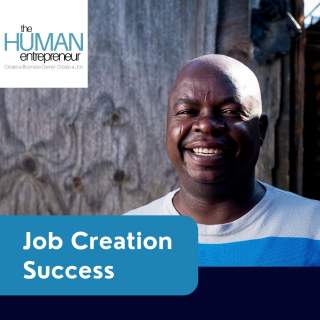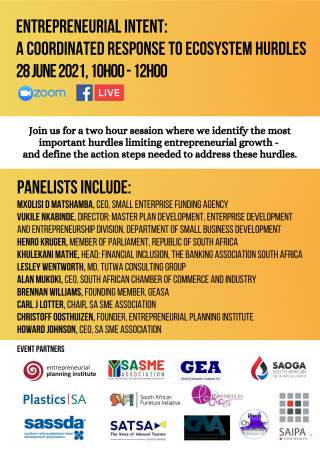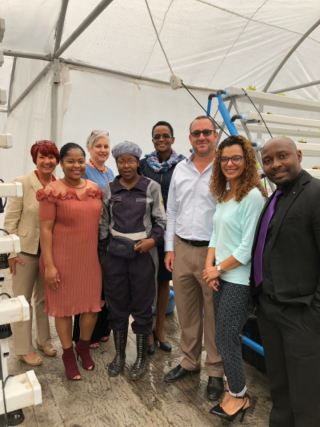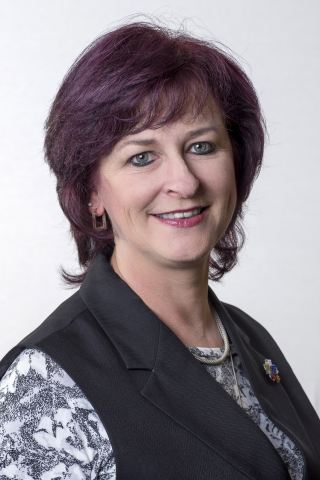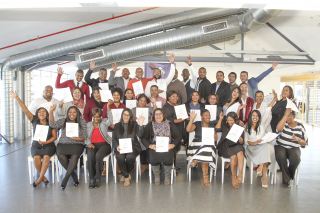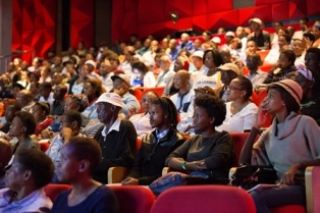New Entrepreneur? When is the best time to start a business?
The combined effects of the pandemic and the state of the South African economy is exacerbating the unemployment figure and growing poverty in South Africa. With a 46% and increasing youth unemployment rate, we could face more riots in future. Although entrepreneurship offers an excellent opportunity for job creation, many are not taking the plunge because they are waiting for the best time to start that business.
But what many do not know is that the best time to start a business is now.
Willem Gous, the founder of The Human Entrepreneur, says, "There is never the perfect time to start a business. There will always be an element of uncertainty. Breaking through that uncertainty and starting a business is what creates the opportunity to make money and create a job for yourself by becoming a business owner". "If it was easy, everyone would be doing it", Gous says.
It takes 6 to 12 months
"But even when you do decide to start a business and form part of an incubator or business creation programmes you are faced with 6 to 12 months and having to attend countless training and this is too much to ask of anyone, especially when you are hungry and desperate now," says Gous.South Africa cannot afford to have people wait 6 to 12 months to start a business. Firstly because of the cost of such programmes and secondly the desperation and frustration on the ground. South Africa needs people to start businesses now, create jobs for themselves and to create economic activity in their communities.
Start a business in 5 weeks
Such a programme has been developed in Africa, for Africa, helping Africa solve its own problems. The Rapid Job Creation Programme, created by The Human Entrepreneur, finds entrepreneurs, builds businesses and creates jobs in five weeks or less. Africa Tikkun Services currently use this programme to help their alumni to become profitable business owners, create a job for themselves and become financially sustainable.
Case Study
"For example, in November 2020 we took 50 people from Diepsloot and Orange Farm in Gauteng and gave them the task of building a business in 21 days. They had to make enough profit to sustain the business owner. "From that process, 30 business were created - from mechanics and internet cafes to school transport and many more - and three months later, 85% of them were still trading while an additional eight businesses were started to create extra revenue streams. No coaching, mentorship or support was provided in those three months - the tools for resilience and adaptability were provided during the programme's roll-out," says Gous. Six months later, 62% of the businesses created are still trading.
South Africa has a locally developed solution that can help the nation address joblessness and hopelessness by creating business owners in weeks and assisting people to become financially self-sustainable. Visit http://www.TheHumanEntrepreneur.org for more information or email This email address is being protected from spambots. You need JavaScript enabled to view it.
Job creation initiative fast-tracks entrepreneurial success
A job-creation initiative that aims to get unemployed South Africans started in their own small businesses quickly has been gaining momentum. The Rapid Job Creation Programme is the brainchild of Willem Gous, who says that it's possible to launch a new business that will financially sustain the founder in a matter of weeks - without funding.
“The latest figures from Stats SA shows a 46% youth unemployment rate, and that is a ticking time bomb. Looking for a job is not an option anymore. South Africans have to take charge of their own employment and the best way to do that is by starting a business. And the good news is almost anyone can do it.” says Gous.
Making it easy
Entrepreneurship can feel overwhelming when you talk about business models, business plans and more. Says Gous: “That is where our training programme is different, because it presents entrepreneurship within the context, abilities and resources of South African youth, sparking an interest in entrepreneurship while promoting resilience and adaptability.”
Funding
“Many people have a dream of starting a business but don’t because they believe it can’t be done without funding,” says Gous. In November 2020 the programme enlisted 50 people from Diepsloot and Orange Farm in Gauteng and gave them the task of building a business in 21 days. They had to make enough profit to sustain the business owner. “From that process 30 business were created - from mechanics and internet cafes to school transport, food and many more. However, none of these businesses required any external funding, showing that people do not have to wait to establish a busines, they can start today and become economically empowered.” says Gous.
Successes
"Three months later 85% of the 30 businesses created in November 2020 were still trading while an additional eight businesses were started to create extra revenue streams for the owners. This shows that the programme instils two of the most entrepreneurial traits - resilience and adaptability in people who otherwise might never see themselves as entrepreneurs,” he says.
No ideas needed
The programme shows that you do not have to have a brilliant business idea to attend. “Business ideas are everywhere and easy to find in a matter of days or hours. The problem is not that there are not enough good business ideas, but rather in testing them and making sure they generate an income for you. Some of the participants in the initial group of November 2020 started with three or even four business ideas in the 21 days until they found the one that worked for them.” says Gous.
Working together
“Our company works with other organisations to economically empower people by getting them to start their own sustainable businesses. Currently we work with Afrika Tikkun Services but we are actively looking for new partnerships to help develop more business owners and create jobs” he says.
Organisations can reach Gous at This email address is being protected from spambots. You need JavaScript enabled to view it. or visit http://thehumanentrepreneur.org
Entrepreneurial Intent: A Coordinated Response to Ecosystem Hurdles
With South Africa facing record unemployment - the third highest globally - it is clear that entrepreneurship is the solution to this continuing disaster state. Join us for a two hour session where we identify the most important hurdles limiting entrepreneurial growth - and define the action steps needed to address these hurdles.
The format of the event is two panel discussions with question and answer sessions followed by a summary where agreed actions are laid out and the work can begin. The first panel, chaired by SA SME Association CEO Howard Johnson will focus on economic recovery and the Sector Recovery Plans of SA Associations. The second is chaired by GEASA founder Brennan Williams will deal with Strengthening the SME ecosystem by deepening relations between Government, Big Business and Small Business in support of the Economic Recovery plan.
Panelists include CEO of SACCI Alan Mukoki, Lesley Wentworth, MD of Tutwa Consulting who is representing the EDSE, Khulekani Mathe the Head of Financial Inclusion at BASA, Mxolisi D Matshamba, the CEO of SEDA, Henro Kruger MP and Vukile Nkabinde, Director of Master Plan Development in the Enterprise Development and Entrepreneurship Division of the DSBD.
Entrepreneurial intent is regarded as the best predictor of actual entrepreneurial behaviour. More needs to be done to create an environment where entrepreneurship can thrive. Practical solutions to address issues such as black-listing, pandemic recovery, technology transfer, access to markets and funding and red tape reduction are on the talking list. The aim is to promote collaboration between government and business of all sizes to create a conducive entrepreneurial ecosystem.
Join us and put forward your questions. Which hurdles should be prioritised & what practical steps can they be resolved? How can government and business collaborate better to address the hurdles preventing entrepreneurial growth?
Get involved, find out more and register on this link: https://the-epi.wixsite.com/intent
Media Enquiries:
Dylan James
This email address is being protected from spambots. You need JavaScript enabled to view it.
066 206 2109
General Enquiries:
Carl Lotter
This email address is being protected from spambots. You need JavaScript enabled to view it.
Re-building the eco-tourism sector with YES
Author: Emma Montocchio, Problem-Solver, Decusatio
The tourism and eco-tourism sectors have been particularly hard hit as a result of the COVID-19 lockdowns and border closures. As the economy starts to re-open, organisations can use powerful incentives such as YES to help re-build the sector.
The Youth Employment Service (YES) incentive out of the Department of Trade, Industry and Competition (DTIC) rewards organisations who create youth jobs, with the opportunity to move up to 2 full levels on their B-BBEE scorecard.
What’s great about YES is that the youth that you appoint to your program don’t need to work inside your own organization – if you are passionate about eco-tourism, you can deploy your youth into a series of tourism and eco-tourism jobs where they can gain valuable industry experience.
With youth unemployment running at nearly 65% in many of the tourism-focused areas, here are examples of some of the YES programs we are currently working on where corporate sponsors can benefit from the B-BBEE incentive and contribute to re-building the sector:
Anti-poaching, drone and wildlife monitoring initiatives
With foreign tourism income being pulled out of the sector, anti-poaching and wildlife monitoring projects quickly became under-funded. As restrictions begin to ease, there is a lot of capacity for funding these kinds of projects and these represent a great way to invest in the sector for the long-haul.
Hospitality and Culinary
Between Limpopo and Mpumalanga roughly 150 000 matriculants graduate each year with only 30% achieving a Bachelors Degree pass. The hospitality sector allows youth without tertiary qualifications or a University level pass to be able to enter the workforce and get valuable work experience.
Equip a Beauty Spa or laundry service
Integrate your Enterprise and Supplier Development (ESD) with your YES investment and help young women establish either a Spa or an innovative low-water usage laundry service. What’s great about these business models is that your investment will see youth learn to become business owners and contribute to a broader tax base in the country.
Support Community Healthcare and Sanitary Pad manufacturing
COVID-19 has heavily impacted communities in Mpumalanga and Limpopo, particularly on the healthcare front. With access to healthcare infrastructure limited, organisations can partner on novel concepts including equipping Community Healthcare Worker initiatives or investing in sanitary pad manufacturing solutions as part of their ESD or SED spend. This solution allows your investment in a YES program to create new business owners and manufacture sanitary pads which can be donated to the local communities, schools and charities while tackling a very real healthcare challenge for young women.
The YES B-BBEE incentive is a powerful tool for securing recognition on your scorecard and with the right partner, you can build high-impact projects while integrating multiple elements for maximum return.
Cabinet has approved the Tourism Sector Recovery Plan which aims to get the sector back to 2019 levels by 2023. As part of this plan, the inclusion of women and youth are key to re-building the sector and we look forward to engaging with partners on these projects.
For further information: Emma Montocchio, Decusatio
E-mail: This email address is being protected from spambots. You need JavaScript enabled to view it.
Rooftop farms may be next big thing in agri-business - Signium Africa
Rooftop farms may be next big thing in agri-business – Signium Africa (www.signium.co.za)
City-wide hydroponic rooftop farming co-operatives have the potential to become the next big thing in commercial agriculture. The prediction comes from Signium Africa, an executive search and talent management company with a large book of agri-business clients in South Africa and across the sub-Saharan region. Annelize van Rensburg, director responsible for Signium Africa’s agriculture portfolio, says first signs of the rooftop farming explosion are already evident, with black small-scale entrepreneurs in the forefront.
Van Rensburg notes: “We work for major corporates in the agricultural industry, but stay close to all important developments in the sectors we serve and the growing potential of hydroponic-based rooftop gardens in inner cities is the biggest trend on the mid-term horizon.
“Many of today’s big agri-businesses began as farming cooperatives that were formed decades ago when farmers banded together to achieve economies of scale and secure sustainable profits. The burgeoning growth of individual rooftop farms suggests similar potential exists for the formation of city-wide cooperatives by rooftop farmers. “The trend is taken seriously by the banks and organisations like Agbiz, the agricultural business chamber.
We expect critical mass in the next couple of years.” Rooftop farms are created when ‘agripreneurs’ rent empty space on the top of city buildings and use water-efficient hydroponic cultivation to grow vegetables and other crops. Inner city locations create logistic efficiencies as the farms are within walking distance of their target market – city dwellers looking for affordable food sources.
Karen Grobler, Agbiz marketing and communications manager, confirmed the organisation monitored transformation initiatives, including rooftop farms, and was excited by prospects. She says: “Our focus is on established formal business, but these small-scale entrepreneurs certainly have potential for sustained growth. We’re particularly impressed by the resourcefulness of these industry entrants.
“They are often businesswomen with a talent for creating solutions. For instance, some are looking at bio-reactors and solar energy to reduce their reliance on the electricity grid as hydroponics need a dependable power source. They already supply local retailers. Further growth can be expected.” The banks are also close to rooftop developments. Loffie Brandt, head, sales enablement, at Absa Bank, says there is “significant future potential for a massive uptick”.
He adds: “It is certainly a space where we could play in as finance is needed by all growth-minded business. Size is not always essential as with hydroponics there is potential for high-volume production at a single site. This suggests commercial viability could be achieved by small, individual operators.” One highly successful agripreneur, Sibongile Cele, has already demonstrated the growth potential up on the roof.
Her Mcebo Wealth Rooftop Farm has been supplying organically grown produce for more than two years. Crops include lettuce, spinach and herbs. The hydroponic system employs metal racking for maximum space efficiency, enabling vegetables to be grown ‘off the shelf’. Her operations in Hillbrow, Johannesburg, were funded by the Small Enterprise Development Agency and she currently reaches retail markets via an agent. She says: “I have an accounting background, so commercial success is important to me, but I also have a social mission. Providing food for the community gives me a sense of purpose.
It is also important to set an example for other women and show we can be successful, run businesses and provide food for our families and communities. “This is only the start. The sky’s the limit for rooftop farming.” Ends
Signium Africa (previously Talent Africa) is a leading South Africa-based executive search and talent management company servicing sub-Saharan Africa.
Website: www.signium.co.za Tel: +27 11 771 4800 Issued By: Tale Spin Media & Marketing Zelda Williams 082 461 0689 or Gillian Schmid 082 960 3233 This email address is being protected from spambots. You need JavaScript enabled to view it. This email address is being protected from spambots. You need JavaScript enabled to view it.
From Used Paper Towels to Firebricks
Whilst paper towels from bathroom dispensers can be recycled, they really should not be. Given that they are used to wipe hands and mouths, they can harbour all sorts of bacteria which can contaminate entire loads of recycling.
We have therefore found another use for these towels, and for other paper products such as egg cartons, cereal boxes, and paper; the firebrick.
The firebrick is a paper bricks which is used to either replace or complement firewood as fuel for domestic purposes. These bricks are made of soaked and compressed waste paper, and are the eco-friendly alternative to cutting down trees for cooking or heating.
Benefits of using Fire Bricks
- Reduce deforestation;
- Reduce carbon dioxide emissions (CO2) into the atmosphere;
- Recycle waste locally No long walking to collect firewood;
- Reduced fossil fuel consumption;
- Increased biodiversity;
- A quarter brick boils 1 litre of water within 15 minutes in a traditional stove;
- Approximately 3 - 4 bricks can cook a meal in a traditional pot;
- 10 bricks can cook a meal in a traditional pot for approximately 40 people;
- Paper bricks can be used in a coal stove;
- Paper bricks can be used under 3-legged pots or in fire places.
- The production and sale of paper bricks can be income-generating.
Motor Industry heavyweights announce important business transformation initiatives
Two major role-players in the South African motor retail industry – the Retail Motor Industry Organisation (RMI) and the Motor Industry Staff Association (MISA) – today announced two important business transformation initiatives in the South African retail motor industry.
The two organisations that carry considerable weight in the motor retail industry (the RMI, with more than 7 500-member businesses, is the leading collective voice of the retail motor industry in South Africa, while the fast-growing and dynamic MISA, with its well over 43 000 members, is the only union that focuses exclusively on the retail motor industry) have pledged their strong commitment to address two pressing issues in the industry: creating more job opportunities for people with disabilities and achieving greater gender equality.
Equalising the gender playing field
The two organisations have agreed to work together to equalise the gender playing fields in what is still a predominantly male-dominated industry, while also attracting and retaining more people with disabilities to this important economic sector.
Issues on the agenda include redressing the inequalities of power that exist in the areas of decision-making and representation, the differences in legal status between different genders, eradicating violence against women in the industry as well as the discriminatory attitudes that still prevail, while achieving an increased participation of women in the labour market.
“No one should be subject to gender discrimination or harassment,” says Martlé Keyter, MISA’s CEO Operations.
RMI CEO, Jakkie Olivier, notes, “As the RMI, we are committed to invest more effort into ensuring gender issues are addressed in collective bargaining and promoting the equal treatment of all employees.”
The two organisations have joined forces with various industry employers and have also already enlisted and trained a team of industry representatives who will champion the two initiatives going forward.
Job creation
According to MISA’s CEO for Strategy and Development, Hermann Köstens, the motor retail industry can play a significant role in creating jobs for people living with disabilities, with a specific focus on young workers.
“With 48 000 jobs lost in South Africa in the first quarter of this year, we as an industry must step up and do whatever we can to stimulate job creation,” he notes. “One way in which to do this is to create more opportunities for people with disabilities and to retain them in our industry.”
Keyter agrees, “We would like to see employers make a mind-shift towards focusing on what people living with disabilities can contribute to the workplace, rather than focusing on what they cannot do.”
“We are strong campaigners that persons with disabilities who want to work, must be given the opportunity to do so if they possess the inherent qualities the job requires,” concludes Olivier.
Inaugural Contact Centre / Business Process Outsourcing Leadership Graduation Ceremony in Cape Town
Inaugural Contact Centre / Business Process Outsourcing Leadership Graduation Ceremony in Cape Town
On 23rd May 2017 the inaugural TULA graduation ceremony for young leaders in the Business Process Outsourcing (BPO)/ Contact Centre sector was held in Cape Town. 59 students from 4 companies have attended the TULA leadership course over the past 18 months.
TULA Founder and CEO, Gareth Pritchard, explained the relevance of the new leadership programme: “TULA works with OnTrac, an Indian based training and consulting company. The programme aims to give students the tools to develop their leadership skills and improve their respective company’s operational efficiency. More than 60,000 students worldwide have participated in the programme. The programme is unique in that it is able to measure the impact of learning activities against each company’s individual business goals.”
Executive Mayor Patricia de Lille commended the students who had taken part in the programme: “I would like to congratulate each and every student who successfully completed their course and graduated in the first graduation ceremony of the TULA leadership programme. The BPO / Contact Centre sector is contributing significantly to the development of our economy, with over 4,500 new jobs created in the last year alone. This growth will only continue if we ensure that our leaders are equipped with globally recognised skills.”
Lufthansa InTouch was one of the participating companies. Their Site Operations Manager, Ian Ohlson commented: “Not only does this program unleash the individual’s leadership potential, it also works towards achieving your organisational goals by allowing employees to take control and influence the bottom-line through individual and group work.”
Capfin Business Operations Manager, Jacques Loubser agreed: “We see such a positive shift in team and individual performance, purely because the learnings imparted during the leadership programme speak to the cornerstones that make up a successful contact centre and in turn our people are able to positively influence the customer value proposition.”
Leading global customer experience and business process outsourcing company, Webhelp, who employs over four thousand people in South Africa, also participated in the programme. Chief operating officer for South Africa, Simon Garabette, commented: “The quality and expertise of our people are extremely important to Webhelp. Engaging in training of this nature highlights our commitment to developing our people, which benefits them and our clients.”
EXL Service is a global provider of decision analytics, operations management, outsourcing, business transformation and IT services. Their country head, Pratap Rao, welcomed the invitation to participate in the programme: “As we continue to grow our teams and to solidify our presence in the industry, the TULA program played a huge role in not just helping the participants understand the importance of building winning teams, but how to build them as well. I can see a program like TULA becoming integral to growth in this industry in any geography.
TULA has also formed a partnership with the Zoe Incubation Centre in Delft to help establish a skills pipeline in Delft to enable access for township communities into the contact centre sector. 7 of Zoe’s students will also be present at the graduation ceremony. The graduation ceremony was held on 23rd May at 14:00 in Cape Town’s entrepreneurial hub, Workshop17, at the V & A Waterfront where TULA has its offices.
TULA provides consulting services and training in the area of Operations Management for the Contact Centre / BPO sector. CEO and founder is Gareth Pritchard email: This email address is being protected from spambots. You need JavaScript enabled to view it.; cell: 0837030822; website www.tulasa.co.za; Linkedin: https://www.linkedin.com/in/garethmpritchard Twitter @BPESACT
Inaugural Contact Centre / Business Process Outsourcing Leadership Graduation Ceremony in Cape Town
On 23rd May 2017 the inaugural TULA graduation ceremony for young leaders in the Business Process Outsourcing (BPO)/ Contact Centre sector will take place in Cape Town.
The ceremony will be attended by Cape Town Executive Mayor Patricia de Lille who will also award the graduation certificates to the students. 59 students from 4 companies have attended the TULA leadership course over the past 18 months. TULA Founder and CEO, Gareth Pritchard, explained the relevance of the new leadership programme: “TULA works with OnTrac , an Indian based training and consulting company. The programme aims to give students the tools to develop their leadership skills and improve their respective company’s operational efficiency. More than 60,000 students worldwide have participated in the programme. The programme is unique in that it is able to measure the impact of learning activities against each company’s individual business goals.”
Executive Mayor Patricia de Lille commended the students who had taken part in the programme: “I would like to congratulate each and every student who successfully completed their course and graduated in the first graduation ceremony of the TULA leadership programme. The BPO / Contact Centre sector is contributing significantly to the development of our economy, with over 4,500 new jobs created in the last year alone. This growth will only continue if we ensure that our leaders are equipped with globally recognised skills.”
Lufthansa InTouch was one of the participating companies. Their Site Operations Manager, Ian Ohlson commented: “Not only does this program unleash the individual’s leadership potential, it also works towards achieving your organisational goals by allowing employees to take control and influence the bottom-line through individual and group work.”
Capfin Business Operations Manager, Jacques Loubser agreed: “We see such a positive shift in team and individual performance, purely because the learnings imparted during the leadership programme speak to the cornerstones that make up a successful contact centre and in turn our people are able to positively influence the customer value proposition.”
Leading global customer experience and business process outsourcing company, Webhelp, who employs over four thousand people in South Africa, also participated in the programme. Chief operating officer for South Africa, Simon Garabette, commented: “The quality and expertise of our people are extremely important to Webhelp. Our people are our biggest asset and it is crucial for us to be able to offer our best people rewarding and meaningful careers. Engaging in training of this nature highlights our commitment to developing our people, which benefits them and our clients through the enhanced levels of customer experience we can deliver to their customers.”
EXL Service is a global provider of decision analytics, operations management, outsourcing, business transformation and IT services. Their country head, Pratap Rao, welcomed the invitation to participate in the programme: “As we continue to grow our teams and to solidify our presence in the industry, the TULA program played a huge role in not just helping the participants understand the importance of building winning teams, but how to build them as well. I can see a program like TULA becoming integral to growth in this industry in any geography.
TULA has also formed a partnership with the Zoe Incubation Centre in Delft to help establish a skills pipeline in Delft to enable access for township communities into the contact centre sector. 7 of Zoe’s students will also be present at the graduation ceremony.
The graduation ceremony will be held on 23rd May at 14:00 in Cape Town’s entrepreneurial hub, Workshop17, at the V & A Waterfront where TULA has its offices.
TULA provides consulting services and training in the area of Operations Management for the Contact Centre / BPO sector. CEO and founder is Gareth Pritchard
email: This email address is being protected from spambots. You need JavaScript enabled to view it.; cell: 0837030822; website www.tulasa.co.za; Linkedin: https://www.linkedin.com/in/garethmpritchard Twitter @BPESACT
Collaborative initiative addresses business development and the unemployment crisis
Unemployment and lack of business skills are proving to be major drawbacks in advancing the economic well-being of the country noting that unemployment is at the highest in 13 years. To tackle these problems, a number of businesses in the private sector and NGOs joined together to stage a business readiness springboard and employment doorway, The Business Warm-Up, to confront head-on the economic challenges facing South Africa’s youth.
Supported by Infinity Learning, Harambee, The Business Place, National Small Business Chamber (NSBC) and the Zinto Marketing Group (Zinto), The Business Warm-Up took place at the Soweto Theatre in Jabulani on Thursday, 26 January 2017.
The City of Johannesburg’s Department of Economic Development endorsed the event and participated through its partnership with The Business Place which operates seven BizHubs in the city to support small businesses.
South Africa has one of the highest unemployment rates in the world. It is with these statistics that the partners in The Business Warm-Up have come together.
With 40% of Johannesburg’s population, Soweto must play its part in creating new jobs. This will only happen if we create a business-friendly environment, reduce red tape, open up new markets, and provide resources and financial support for start-ups and fast growing businesses.
The initiative was aimed at existing business owners, entrepreneurs and future start-ups, and job seekers wanting to enter the workplace, with the intention of stimulating local business, creating jobs as well as assisting job seekers to find employment.
A delegate and aspirant entrepreneur, Cortneigh Halim from Bassonia in the south of Johannesburg commented: “The Business Warm-Up was very informative. I learnt the key concepts of becoming a business owner; these included the different methods of acquiring assistance and advice, as well as the application process for obtaining funding for start-up capital. The information provided fulfilled my attendance at today’s event and the speakers were very knowledgeable. I hope to attend more of these events in the future.”
Zinto’s co-founder Michelle Combrinck said: “When we learned about The Business Warm-Up we were immediately drawn to the initiative as another platform to address the unemployment crisis and offer our insights into uplifting the youth.”
A recent enterprise that Combrinck conceptualised, Zenzele Educational Doorway (Zenzele), gives young hopefuls an opportunity to advance in society and pursue a rewarding career. The opening of Zenzele for wannabe client service professionals is indicative of the need for youngsters to become active job seekers and opportunity creators as youth unemployment remains a crisis.
It is the intention to roll-out this workshop to further communities and reach many more unemployed who require support and assistance in finding sustainable employment opportunities.


